ASTANA – Less than a month ahead of the presidential election, the campaign of six registered candidates, including Karakat Abden, Nurlan Auesbayev, Zhiguli Dairabayev, Meiram Kazhyken, incumbent Kassym-Jomart Tokayev, and Saltanat Tursynbekova, starts to gain traction with candidates traveling across Kazakhstan to introduce their electoral programs.
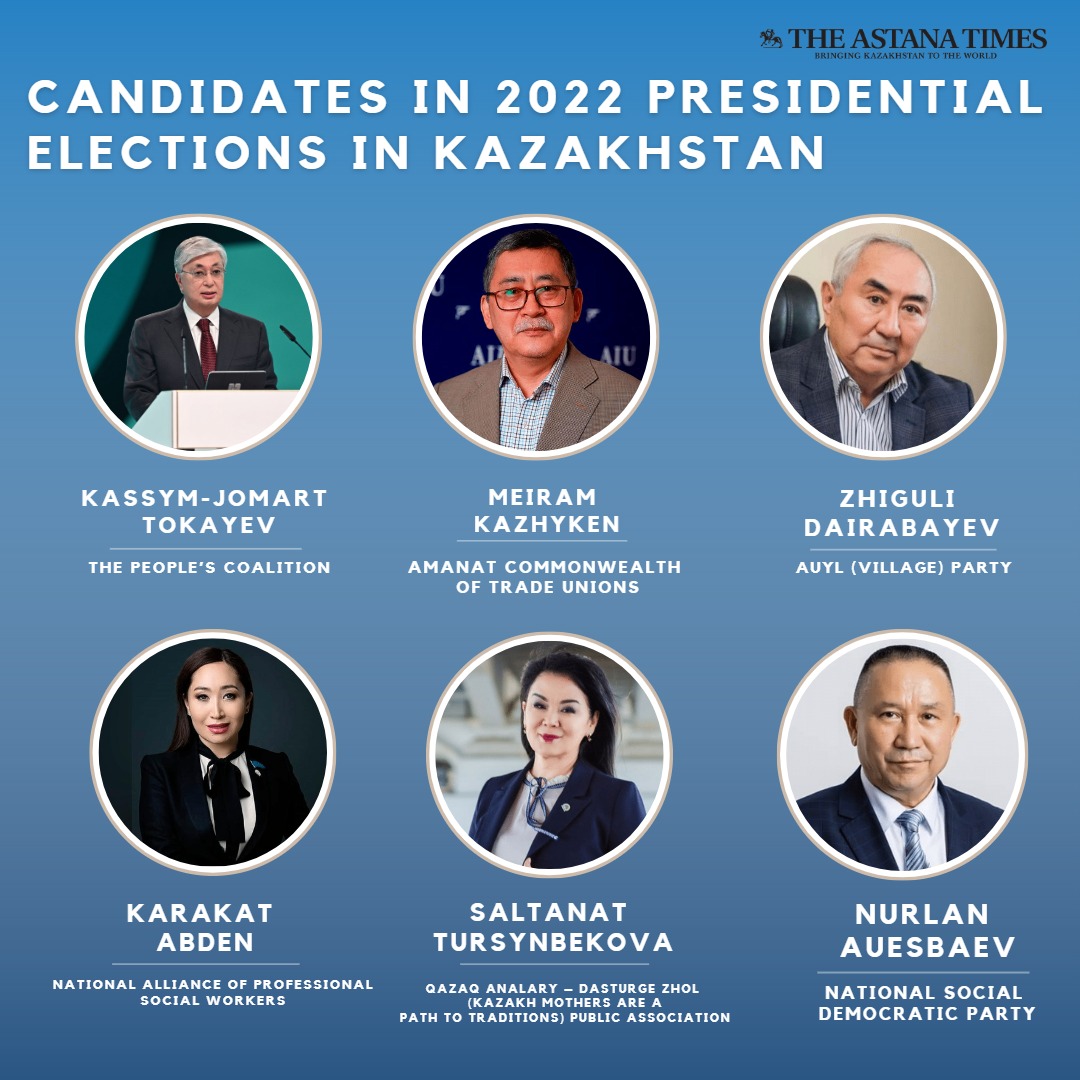
Presidential candidates.
The campaign period that will last till Nov. 18 at midnight has given an opportunity for the candidates to try and convince the public to back them in an election that will decide who will serve the country over the next seven years.
Karakat Abden
Karakat Abden, one of the two female candidates, is now firmly establishing her own platform in the presidential elections campaign based on family and national values centered around people, which she calls the “main wealth of the state.” She aims to “create conditions for a decent life for all Kazakh families.”
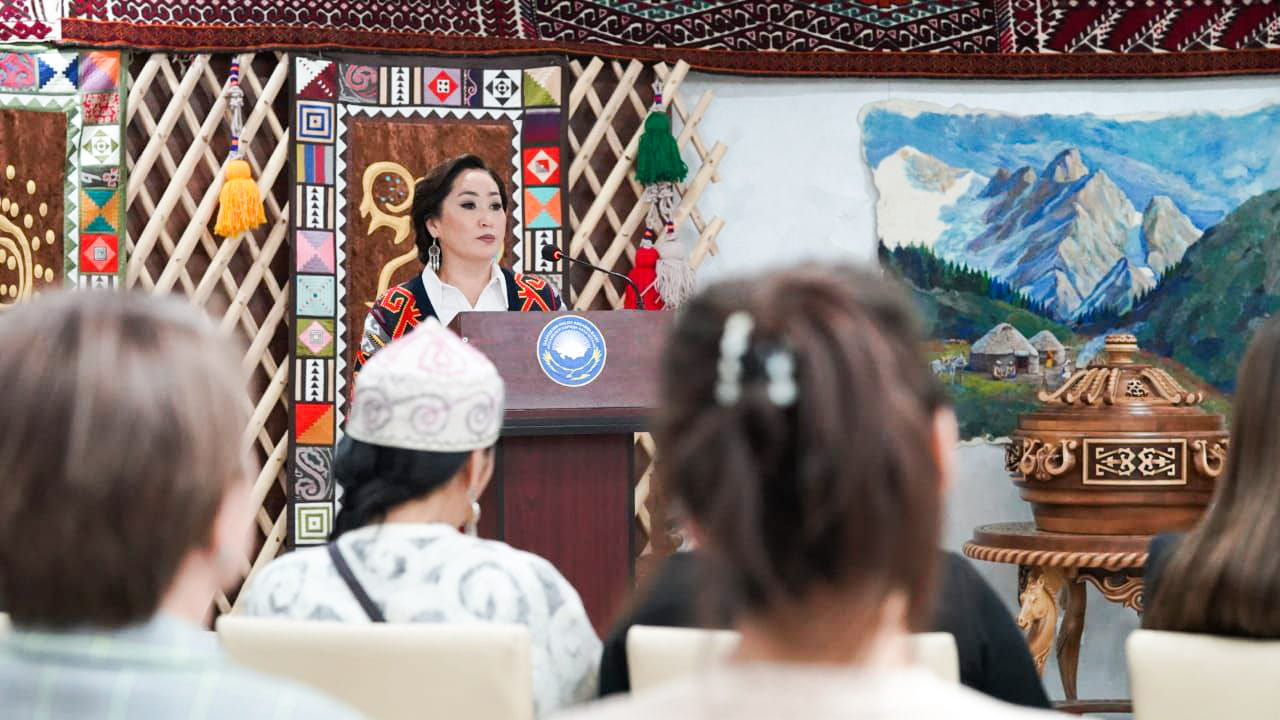
Karakat Abden during her meeting with light industry representatives on Oct. 26. Photo credit: Abden’s Instagram account
Abden started her campaign in rural areas near Astana on Oct. 23 followed by a visit to Shanyrak large families support center in Karagandy the next day.
“The social sphere is a woman’s domain,” wrote Abden on her Instagram page after the meeting.
“Most of those who participated in the meeting, like me, are mothers of many children,” she added, stressing that voters could trust Abden to lead on women-related social issues.
Her next meeting on Oct. 26 with manufacturers and designers of national clothes focused on plans to support Kazakh brands of light industry.
“National clothing vividly emphasizes the culture, tradition and philosophy of our people. Given that my election program is based on national values, this issue could not go without attention,” wrote Abden on Instagram.
On Oct. 27, Abden and her campaign team arrived at the maternity hospital in the city of Ekibastuz.
“All points on my program are socially oriented. Therefore, it pays special attention to important problems of the population, including the development of health care and the system of care for children with rare (orphan) diseases. This is a serious issue that requires a systematic approach in its resolution,” said Abden.
Nurlan Auesbayev
Anti-corruption initiatives and political reforms aimed to end “oligarchic capitalism” are the central themes in Nurlan Auesbayev’s election campaign, a candidate from the National Social-Democratic Party.
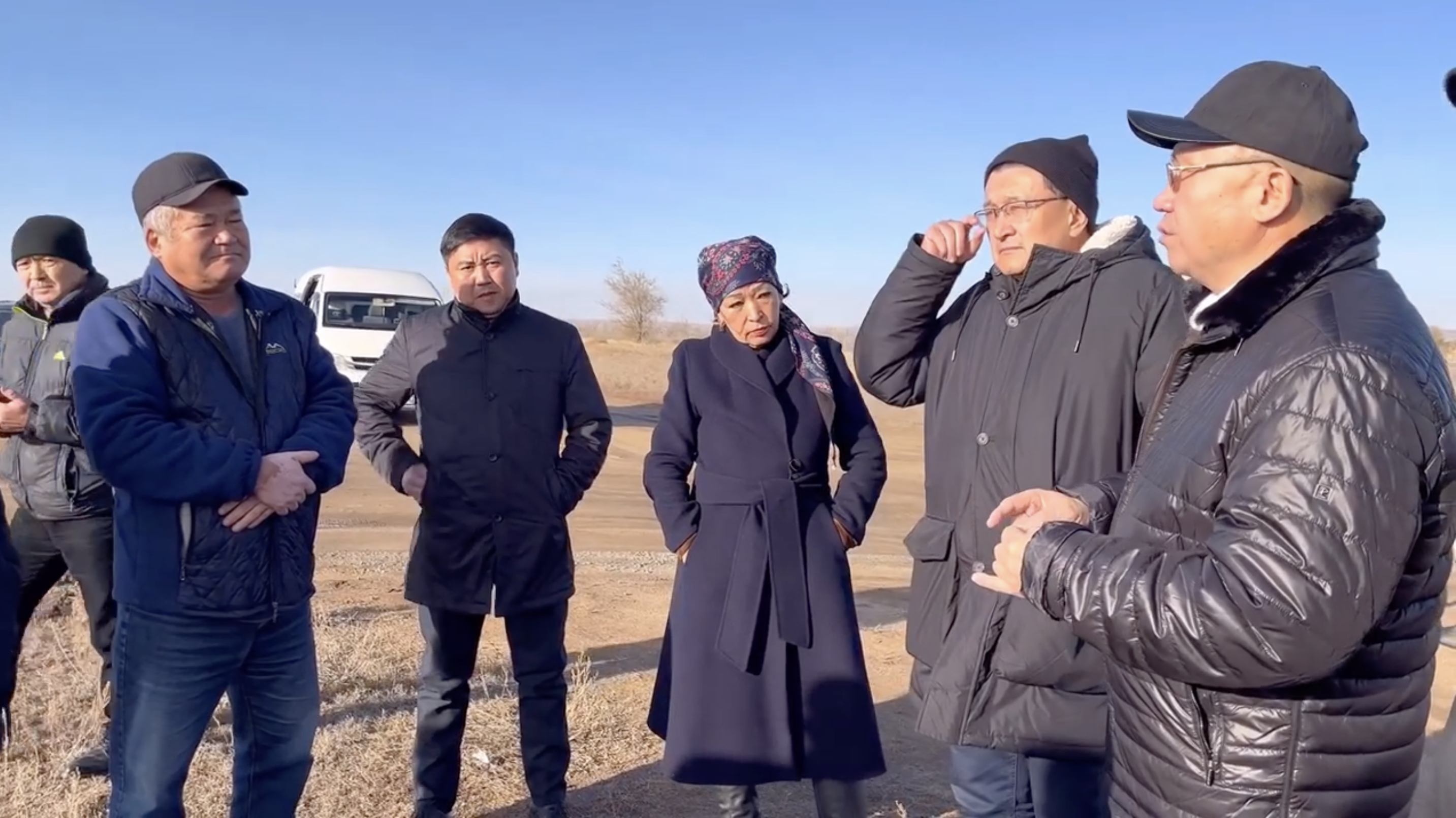
On Oct. 27, Nurlan Auesbayev took part in the inspection of the problematic residential areas of Aktobe. Photo credit: Auesbayev’s Facebook page.
On Oct. 25, Auesbayev met with residents of Shakhtinsk in the Karagandy Region, where major coal mines are located.
“I propose that companies producing natural minerals should be nationalized. This will permit us to take great responsibility to ensure proper working conditions for miners,” said Auesbayev as he laid flowers at the monument to dead miners.
On Oct. 27, he arrived in the Aktobe Region, where he visited the Bestamak village and later took part in the inspection of the problematic residential areas of Aktobe, such as Zhanakonys-4 and Batys-2. Residents shared their concerns over gasification and municipal problems that have not been resolved for years. Auesbayev drew attention to the fact that officials often do not pay attention to the requests of residents.
“My party and I have advocated and will continue to advocate for the introduction of elected akims (mayors) at all levels, as well as the development of local self-governance. I told the residents that if I am elected, I will introduce the standards of life quality for the people of Kazakhstan,” wrote Auesbayev on Facebook.
Zhiguli Dairabayev
Zhiguli Dairabayev, a candidate from the Auyl party, voiced his commitment to creating a “new Kazakhstan” based on three main principles: steppe democracy, high spiritual and moral culture, strong agricultural sector and strong regions.
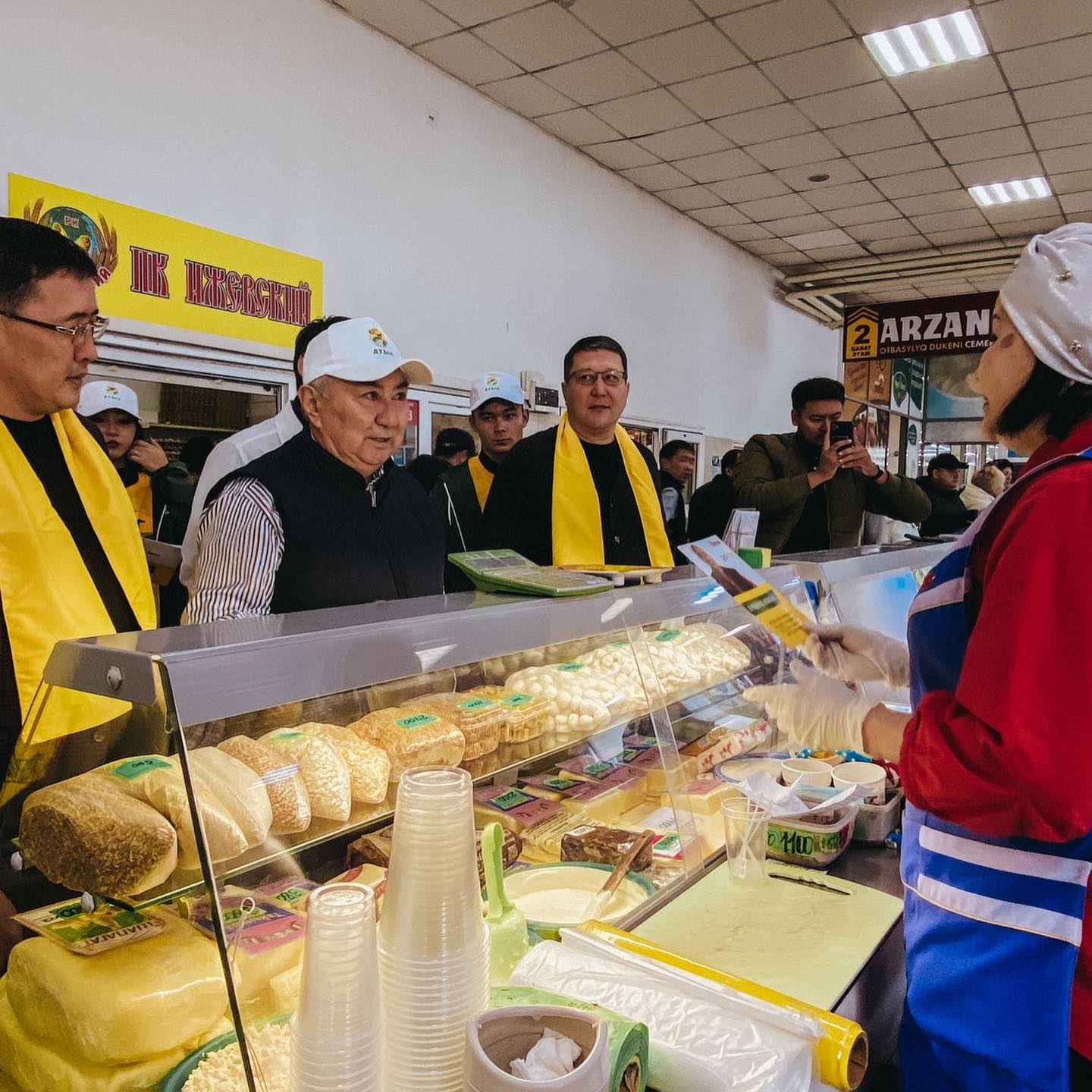
Zhiguli Dairabayev during his visit to the capital’s Shapagat communal market on Oct. 23, where he got acquainted with prices for food and agricultural products. Photo credit: auyl.kz
The rising food prices also took center stage in the election campaign as Dairabayev visited the capital’s Shapagat communal market on Oct. 23, where he got acquainted with prices for food and agricultural products.
According to Dairabayev, it is necessary to develop agricultural production in a sustainable way and increase the production of competitive and export-oriented products to resolve the problem of increasing food prices.
Unsurprisingly, Dairabayev started his campaign in the regions around his native auyl (village) Karakystak in the Zhambyl Region on Oct. 24.
At the meeting, locals shared what a modern auyl should be like and the candidate promised his support and assistance for 6,000 rural settlements throughout the country.
“Auyl and agriculture are indivisible concepts. It is impossible to build a successful Kazakhstan without agro-industry, which, in turn, cannot be built without strong auls,” said Dairabayev at the meeting.
He also visited the Bayzak and Zhualy districts of the Zhambyl Region and met with the agricultural producers of the Turkistan Region.
During his visit to the Kyzylorda Region, famous for its rice production, on Oct. 27, Dairabayev addressed the problem of the shortage of water in the region, which affects the region’s irrigation system.
In his statement, Dairabayev stressed the importance of addressing water scarcity at the state level. “Science and production must work in close interaction and harmony,” he added.
Meiram Kazhyken
Meiram Kazhyken, a nominee of the Amanat commonwealth of trade unions, started his bid for the presidency with a visit to his native Pavlodar Region on Oct. 22.
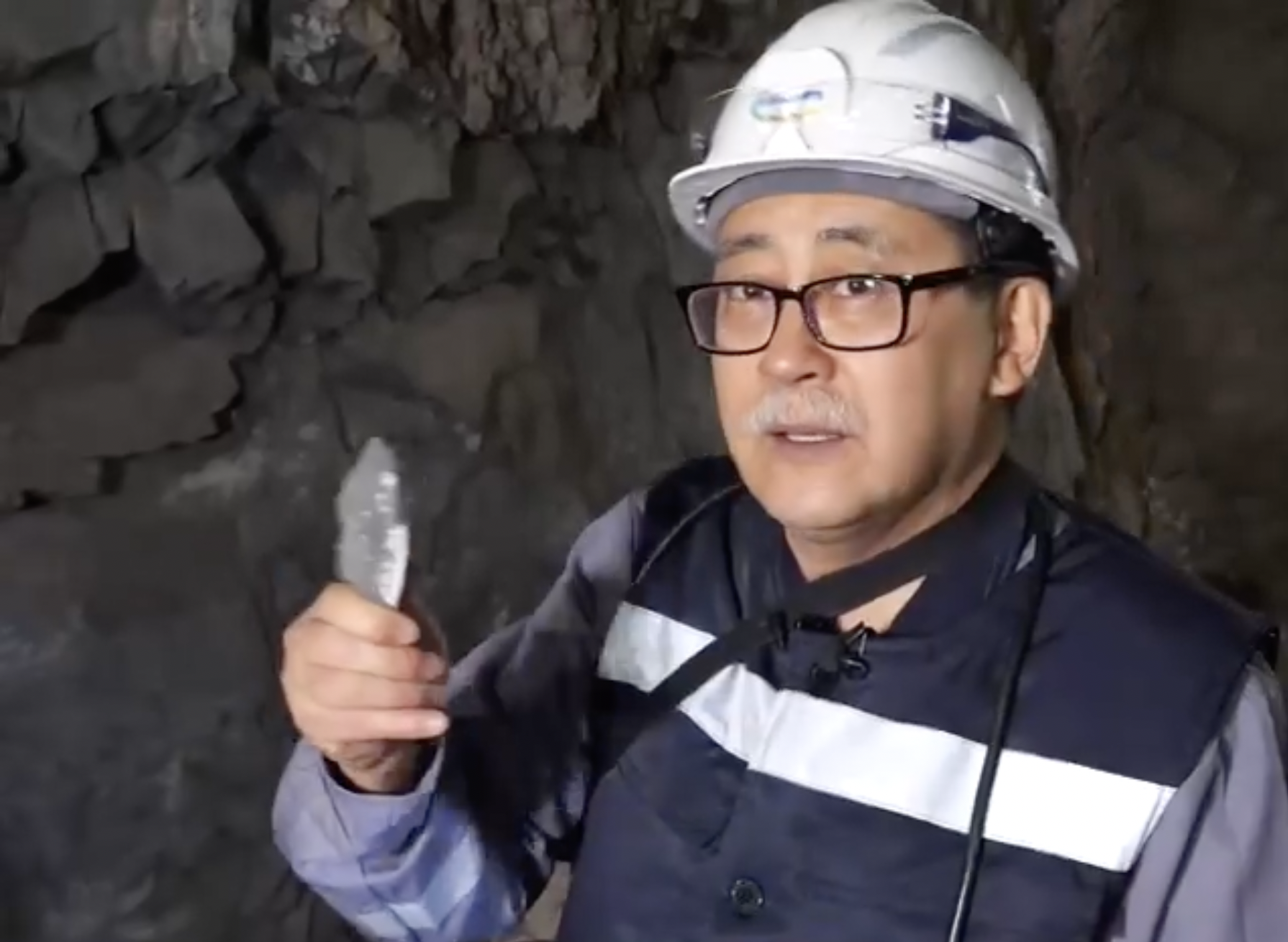
Meiram Kazhyken descended the 260 meters mine shaft, where he saw the working conditions of the miners. Photo credit: Kazhyken’s Facebook account.
During the first meeting with voters at the Center for Youth Initiatives, he spoke about employment, wages, and housing in the regions, in line with his election program that focuses on the individual “regardless of age, gender, nationality, religion, or social status.” The program aims to create equal opportunities for all to develop and fulfill their abilities.
He also met with the employees of the Aksu Ferroalloys Plant and the Pavlodar Alumina Plant.
The candidate spoke about the need to strengthen the role of independent trade unions. He emphasized that it would increase the level of workers’ wages and improve working conditions.
On Oct. 23, Kazhyken continued his trip in the Ulytau Region where he met with employees of Kazakhmys, the largest mining and metallurgical company.
During his visit, on Oct. 26 he descended the 260 meters mine shaft, where he saw the working conditions of the miners. Before the descent, the candidate had lunch at the plant and was shown what was included in the dry ration pack.
One of his election strategies includes a proposal to reduce the retirement age for miners.
Kassym-Jomart Tokayev
Kassym-Jomart Tokayev, who serves his first term as a president since 2019, launched his re-election campaign at the headquarters of the people’s coalition which consists of three parliamentary political parties and 22 national public organizations on Oct. 26.
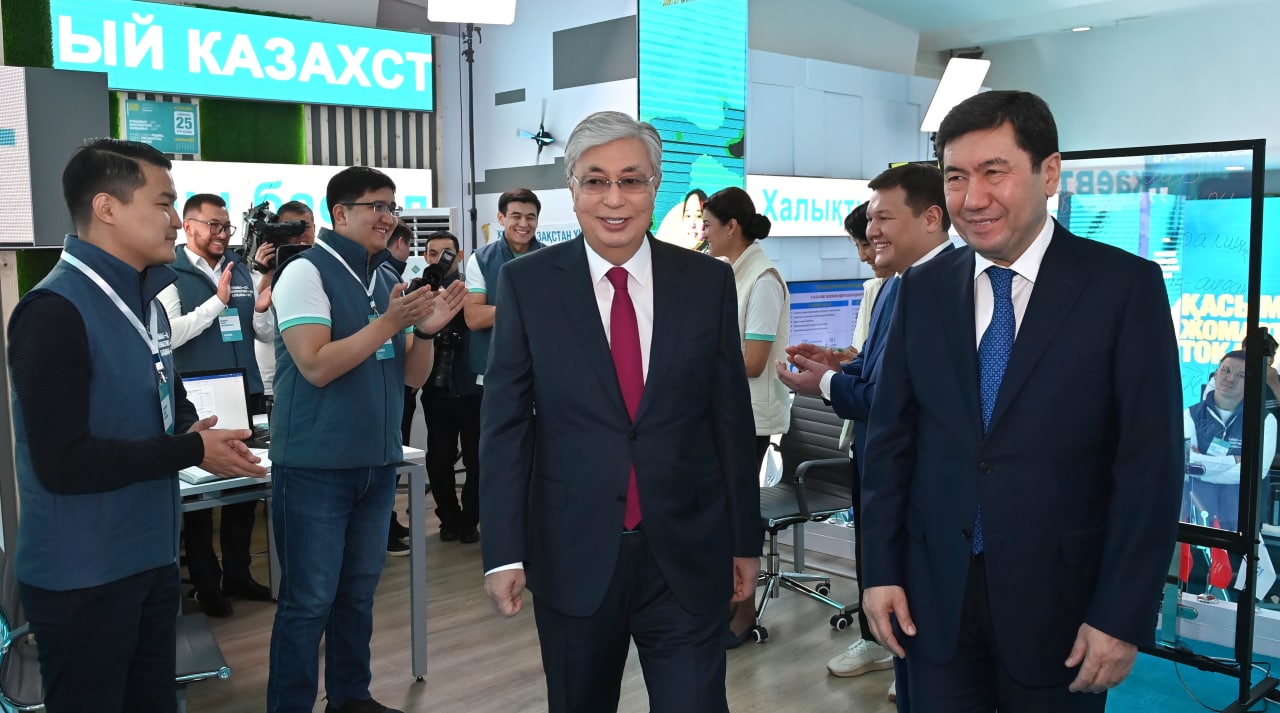
Kassym-Jomart Tokayev visited the headquarters of the people’s coalition on Oct. 26. Photo credit: Toqaev2022 Telegram channel
“Building Just Kazakhstan is my main mission as President,” he said presenting the campaign titled Just Kazakhstan: For All and For Everyone, based on three interconnected principles – a just state, a just economy, and a just society.
Tokayev’s election headquarters meetings began in the Abai Region on Oct. 27, where the head of the public headquarters Yerlan Koshanov met with aksakals (the elderly) and intellectuals of the region to discuss measures to preserve the historical heritage, support the state language, restore historical and cultural monuments, and develop the arts, as reflected in Tokayev’s election program.
Later in the day, Koshanov met with Alikhan Bokeikhan University students.
“Kassym-Jomart Tokayev’s election program gives priority to youth,” said Koshanov. “It is proposed to go away from the ‘for youth’ approach to the ‘with youth’ principle. It means special attention will be given to creating conditions for wide interaction of the state and talented, active representatives of the young generation.”
Tokayev’s government has pledged to create 2.3 million jobs for young people as well as to launch a loan for young entrepreneurs at 2.5 percent. Other promises included creative industry development, construction of dormitories, affordable rental housing, development of tools for the purchase of homes, and a two-fold increase in scholarships.
In the Turkistan Region, Beisen Tazhibaev, head of public headquarters in the region, met with the workers of the Green Turkistan institution.
“A working man is the basis of social structures. We often talk about the importance of raising the status of ordinary working people and promoting them in the country,” said Tazhibayev, highlighting that the workers’ well-being is one of the concepts prioritized by Tokayev.
Saltanat Tursynbekova
Saltanat Tursynbekova’s campaign builds on human rights issues and social activities. As the founder and leader of the Kazakhstan without Domestic Violence project, she has firsthand experience in addressing these issues.
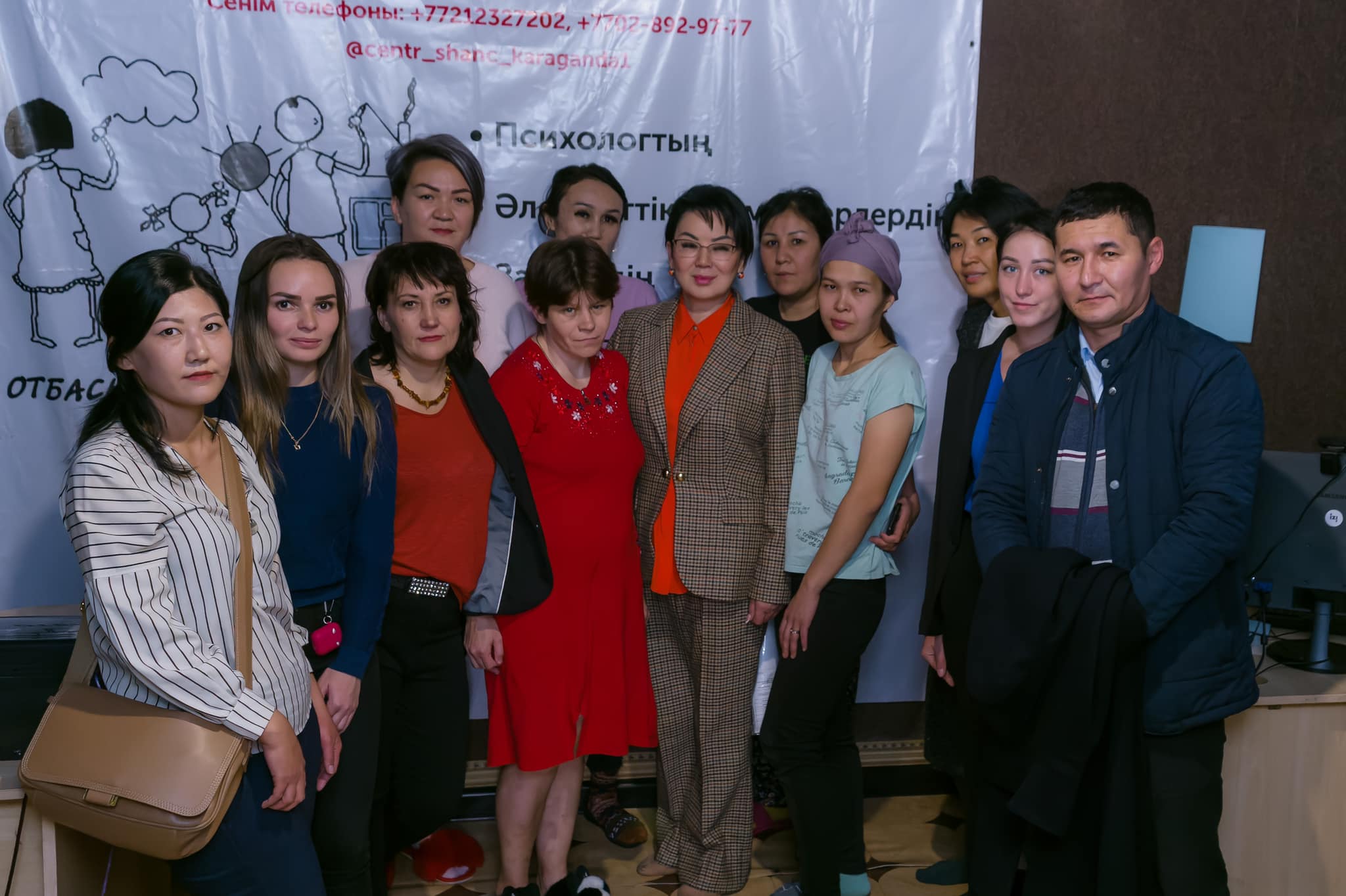
In Karagandy Saltanat Tursynbekova met with victims of domestic violence. Photo credit: Tursynbekova’s Facebook page.
Tursynbekova has focused her campaign messages on justice and social equality with a focus on mechanisms for the protection of women, children, the elderly, and people with disabilities.
On Oct. 24, she met with human rights activists in Astana to discuss gambling addiction, corruption, and violence in society, “the most acute problems of Kazakh society,” according to her.
Her first regional visit was to Karagandy on Oct. 26, where she conducted two meetings with human rights activists and victims of domestic violence.
“Regardless of the current situation, any Kazakh woman has the right to education, health, career, and a normal life without beatings and humiliation. I do not want our women to cry. I will do my best not to let them suffer,” said Tursynbekova at the center for victims of domestic violence.
The next stop in the electoral race was Kokshetau, where she visited the Chance crisis center.
“Through hard work and struggle, we can achieve anything we want. Today I’m running for the presidency. Who could have told me in 1999 that it would turn out this way?” said Tursynbekova, encouraging women to persevere.
In Kokshetau, Tursynbekova also met with physicians at the regional hospital, where she stressed the need to raise the status of medical professionals in the country.
